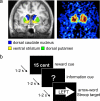Dopamine and the cognitive downside of a promised bonus
- PMID: 24525265
- PMCID: PMC4163051
- DOI: 10.1177/0956797613517240
Dopamine and the cognitive downside of a promised bonus
Abstract
It is often assumed that the promise of a monetary bonus improves cognitive control. We show that in fact appetitive motivation can also impair cognitive control, depending on baseline levels of dopamine-synthesis capacity in the striatum. These data not only demonstrate that appetitive motivation can have paradoxical detrimental effects for cognitive control but also provide a mechanistic account of these effects.
Keywords: PET; attention; cognition; dopamine; motivation; striatum.
Figures


Comment in
-
Dopey dopamine: high tonic results in ironic performance.Trends Cogn Sci. 2014 Jul;18(7):340-1. doi: 10.1016/j.tics.2014.03.010. Epub 2014 Apr 29. Trends Cogn Sci. 2014. PMID: 24793397
References
-
- Barnett V, Lewis T. Outliers in Statistical Data. 3 ed. John Wiley & Sons Ltd.; West Sussex: 1994.
-
- Berridge KC, Robinson TE. What is the role of dopamine in reward: hedonic impact, reward learning, or incentive salience? Brain Res Brain Res Rev. 1998;28(3):309–369. - PubMed
Publication types
MeSH terms
Substances
Grants and funding
LinkOut - more resources
Full Text Sources
Other Literature Sources

